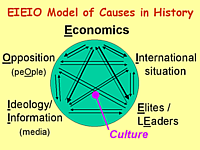Guiding Question(s)
- Did the French Revolution modernize "Germany," or halt a period of
progress?
To what extent did the Napoleonic Phase of the French Revolution modernize which German states?
Napoleon Bonaparte (1769-1821)
- "Child" vs. "Gravedigger" of the Revolution
- 1795 "Whiff of Grapeshot;" Director; 1799-1804 First Consul; 1804-14 & Mar-June 1815 Emperor
- 1792, Sept: Cannonade of Valmy--HRE's general Duke of Brunswick retreats. Goethe: "Here and now a new epoch of world history is starting. You can say you were there."
Underlying Changes, 1750-1850 ;
model of causality in history
;
model of causality in history
- feedback on Q1
- Types/categories of underlying causal factors:
Economic (mode of production; resources)
International (intervention)
Elites and LEaders (individual & small group decisions by power holders)
Ideology & Information (what people believe will happen)
peOple (especially when they Oppose the status quo)
All of these things interact within constraints set by institutions, traditions -> "culture"
Names to watch out for (in readings for this week):
- Hardenberg
vom Stein
W. v. Humboldt
Kant
Fichte
Pestalozzi
Scharnhorst
Gneisenau
The German States and the French Revolution (see textbook chap. 1!-prepare for Wed.)
- Austria
- Prussia
- Bavaria
- Saxony
- Württemberg, Baden
- Westphalia, Berg
Question 2
- Read Schulze, S2-4 (pp. 109-119)
- Relate the EIEO concepts to the factors that could bring about change mentioned in those sources.